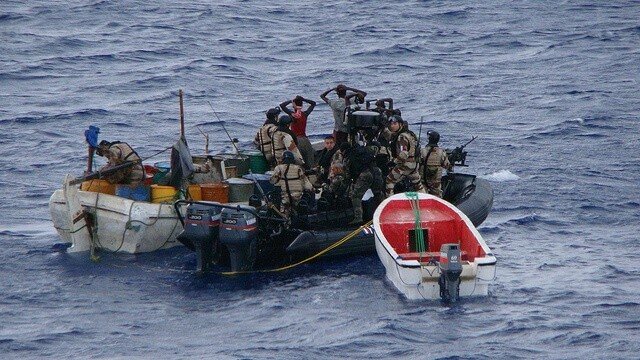
Recent Surge in Maritime Attacks by Pirates in the Arabian Sea
Introduction
The Arabian Sea, a vital maritime route connecting the Indian Ocean to the Persian Gulf, has recently witnessed a disturbing surge in pirate attacks, threatening the safety and security of global shipping lanes. This increase in maritime piracy has raised concerns among nations, international organizations, and the shipping industry, prompting a reevaluation of security measures in the region.
Because of its advantageous location, the Arabian Sea, a vital waterway for global trade, has long been a piracy hotspot. The level of piracy in the area has fluctuated over time, with peaks in criminal activity occurring between times of relative calm. But there has been an alarming upsurge in pirate attacks in recent months, underscoring the necessity of coordinated efforts to counter this maritime threat.
Table of Contents
Nature of Attacks in the Arabian Sea
A concerning degree of sophistication has been showed by pirate attacks in the Arabian Sea, where attackers have used a range of strategies to target commercial vessels. Usually operating in swift, small boats, the pirates are equipped with automatic weapons and occasionally even rocket-propelled grenades. By using these strategies, they can surprise their targets by moving quickly to board big cargo ships, tankers, and fishing boats.
One notable aspect of these attacks is the pirates’ ability to adapt to changing circumstances. Reports suggest that some of the criminal networks involved in maritime piracy in the Arabian Sea have connections with other illicit activities, such as smuggling and human trafficking. This complex web of criminal enterprises makes it challenging for authorities to curb these activities effectively.
Geographical Hotspots
Geographically, the Arabian Sea has become a hotspot for pirate activities, with specific areas experiencing a higher frequency of attacks. The waters off the coast of Somalia, a traditional piracy hub, have once again become a focal point for criminal activities. Additionally, the northern Arabian Sea, near the Gulf of Oman and the Strait of Hormuz, has witnessed a surge in pirate attacks, threatening the vital transit routes for oil shipments from the Middle East.
Implications for Maritime Trade
The global economy and maritime trade are facing serious challenges as a result of the rise in pirate attacks. An essential conduit for oil shipments from the Middle East to major markets in Asia, Europe, and North America is the Arabian Sea. There could be effects on energy prices, higher insurance costs, and delays as a result of disturbances in this area.
The attacks also have implications for the fishing industry, as pirates frequently target fishing vessels for ransom or hijack them for other illegal activities. This not only affects the livelihoods of local fishermen but also disrupts the global seafood supply chain.
International Response
An international response aiming at strengthening security measures and cooperation among affected nations has been prompted by the surge in maritime piracy in the Arabian Sea. In order to discourage pirate activity, the United Nations, through the International Maritime Organization (IMO), has called for more patrols and coordination. The region’s waters are being guarded by naval forces from many nations, including those taking part in international coalitions.
Regional Cooperation
Cooperation among regions is essential to addressing the piracy issue. Coastal states around the Arabian Sea need to work together to share intelligence, conduct coordinated patrols, and put in place strong legal frameworks to bring pirates to justice. A framework for this kind of cooperation is provided by the “Djibouti Code of Conduct”, a regional agreement intended to improve maritime security in the western Indian Ocean and the Gulf of Aden.
Also Read :: Missile Attack on India-Bound Tanker Raises Red Sea Tensions
Recent Attacks on Merchant Vessel in Arabian Sea
- A drone struck the chemical tanker MV Chem Pluto on the west coast of India. The attack coincided with growing worries that Houthi militants backed by Iran were allegedly targeting a number of commercial vessels in the Red Sea and Gulf of Aden as a result of the Israel-Hamas conflict. The ship, which was crewed by 21 Indians and 1 Vietnamese, anchored in the outer anchorage off Mumbai. On route to Mumbai, it was escorted by the Indian Coast Guard vessel ICGS Vikram.
- A cargo ship named MV Lila Norfolk was involved in a high-seas hijacking incident while it was sailing to its destination. Carrying a valuable cargo, the ship sent out distress signals as armed pirates took over, putting the crew and cargo in serious danger.
Private Sector Initiatives
In addition to government-led efforts, the private sector plays a crucial role in mitigating the risks associated with pirate attacks. Shipping companies are increasingly investing in advanced technologies such as satellite surveillance, automated threat detection systems, and secure communication channels to enhance the safety of their vessels. Training crews in anti-piracy measures and implementing best practices for navigation and security protocols are also essential components of the industry’s response.
Conclusion
The recent surge in pirate attacks in the Arabian Sea poses a significant threat to maritime trade, security, and the well-being of those navigating these waters. Addressing this complex issue requires a multifaceted approach, encompassing international collaboration, regional cooperation, and private sector initiatives. As nations work together to strengthen security measures and deter pirate activities, the hope is that the waters of the Arabian Sea will once again become a safe and secure passage for global maritime trade.
Click here to join our Telegram chanel
You will get information, news, and support related to Merchant Navy.
